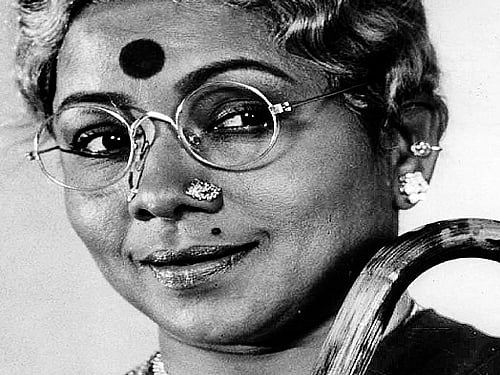Remember that famous song “Muthu kullikka vaarigalaaa…”? That famous Tamil song is still so fresh and eminently hummable — for me, it epitomises the high-octane energy and perfect timing that Manorama brought to the screen. And opposite her was ‘Thai’ Nagesh. This song from Anubhavi Raja Anubhavi (1967) by TMS and L R Eshwari went on to be re-recorded in Hindi by Mehmood where it became an all-India hit.
Manorama. An actor who worked in over 1,500 films and over 1,000 stage productions in a career spanning 57 years. Breathtaking. She began in theatre, like so many of our early Indian actors, and moved on to films, and the world of television. Complete success in capturing all the three worlds of entertainment. But more importantly, she had captured the hearts of the people, and earned the title of ‘Aachi,’ which means grandmother in Tamil. When her heart stopped beating, millions of admirers messaged each other in the social media world saying that ‘Aachi is gone,’ and that bit of news flashed across the world to millions in seconds.
Born to act
Manorama, who passed away last week, was originally named Gopishantha by her mother, and was born on May 26, 1937 in Mannaarkudi in the then Madras Presidency.
In an interview about eight years ago to a foreign TV channel, Manorama had mentioned that she was affectionately called paapa by her mother Ramamirthammal. She grew up in the small town of Pallathur in the Chettinad region, where the rich Chettiyar merchant community would sponsor all-night plays so that people could stay awake during the auspicious Vaikunta Ekadasi.
The first play in which she sang behind the stage was called Andaman Kaidhi. She went on singing songs behind the screen for Tamil drama actors, and soon became known as Pallathur Paapa. Harmonium Thyagarajan, who she often referred to as her first guru, decided that ‘Manorama’ was a better stage name. The stage name he gave this little girl from Mannaarkudi became synonymous with one of Tamil cinema’s legends. She stepped onto the stage as a second lead actor in a play called Vidhiyum Vichitram.
Comic chemistry
Fast forward to 1958 and the start of her half-a-century-long film career with Malaiyitta Mangai. Her most successful pairings as a comedienne were opposite the caustic and superbly witty ‘Cho’ Ramaswamy, and with the silver-tongued, energetic ‘Thai’ Nagesh. She earned a name for her singing as well — many of them going on to become runaway hits — “Vaa vadhiyare Ootande…” from Bommalattam (with Cho) is just one of them that brings out a guffaw even today with its typical Madras Tamil.
How can you pick out favourite films from that colossal number that she worked in? One would need days to talk about them. Nevertheless, some eternal hits will have to be mentioned: Gallata Kalyanam, Edhir Neechal, Server Sundaram, Unal Mudiyum Thambi, Saraswathi Sabatham, Apporva Sahodargal…for me, all of those roles have merged over the years into that twinkle-eyed lady in real-life, who could outwit the wittiest interviewer, but would always make everyone feel good — she never put on airs in real life, and was so approachable — just like the Aachi she became to millions.
My favourite Manorama role is the one she played as ‘Jil Jil Ramamani’ (Rosa Rani) in Thillana Mohanambal (1968) — her role in the film as the large-hearted, loud, raucous-voiced artiste was so endearing that it made you laugh, even as she moved you to tears with her innocence and goodness.
She had also worked in Kannada films including Geddavanu Nane, in which she also sang; Telugu films, and a Hindi film with Mehmood (Kunwara Baap). Tributes have been paid by hundreds of admirers. But what Kamal Haasan said is perhaps the most apt: “…many, even at her funeral, will inadvertently have a smile on their faces when they reminisce those memorable screen moments…” Goodbye, Aachi. And thank you for all the music, the tears, the laughs, and the smiles…

